DESTITUTE Filipinos remain chewing on the same cud contentedly: hope. Nine out of 10 Filipinos look forward to this year with optimism rather than with fear despite their relentless struggle with poverty, the newspapers said.
Why? It’s not as if they had a choice. As a proverb puts it: “Hope is the poor man’s bread.” Hope sustains 78 per cent of Filipinos who had suffered “severe hunger,” surviving every day by eating almusal, tanghalian and hapunan in one meal—the proverbial “altanghap.”
Apart from hope, doctors from the National Center for Mental Health and the Philippine Psychiatrists Association say that Filipinos can cope with the social pressures because they are “crisis-oriented” to begin with, because of their “strong faith in God, sense of humor and concern for others.”
It is interesting to note that according to these institutions, one of every 100 Filipinos is schizophrenic. The relatively insignificant rate is attributed to our innately Filipino approach to solving problems.
Translation: When the going gets tough, Juan de la Cruz still manages to look for a way to make life appear rosy.
Life is still good because we have a perverse sense of divine providence that we pray for almost anything, much like how Amy (Gina Pareño) in Kubrador prays that she will not get caught by police when collecting jueteng bets from her patrons. It is like praying for the powers of the cosmos to get us through almost everything, whether good or bad.
Life is good because we can make a laughing stock of everyday crisis and the harsh realities plaguing us. Life is good because Juan has his immediate family, friends, kababayan, neighbor, noontime shows, and telenovela to rely on whenever he needs help.
These things are very apparent around you like the fun and entertaining noontime programs like Wowowee and Eat Bulaga! which promote mendicancy through high-stakes game shows. (It has been a year now since the Wowowee stampede.)
But we seem to tolerate, more than anyone else, the events that expose the negative aspect of our culture. There may not be a second Wowowee celebration at the Philsports Arena (formerly Ultra), but there is still Willie Revillame on your afternoon screens, making a fool of our poor people by making them dance Boom Tarat Tarat .
Going back to the psychiatrists’ comment on Filipinos as a “crisis-oriented” people, that may be true. But we should also remember what Dr. Joel Steinberg, author of numerous books and articles on Southeast Asia, has said about the Philippines. He said that being crisis-oriented appears to have become an “institutionalized mode of behavior” of Filipinos.
No matter the negative connotation of Steinberg’s analysis, Filipinos have no choice but to be hopeful. Perhaps, indeed, crisis is the stuff we live for.
It has been planted in our “collective consciousness” that the way we handle problems is part of Filipino heritage. This is what I think sustains the Filipino amid social pressures and endemic problems like corruption and poverty. Hope carries the Filipino through the day.
What are you hopeful for this year? Then what does that make of you?

















